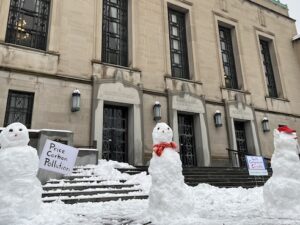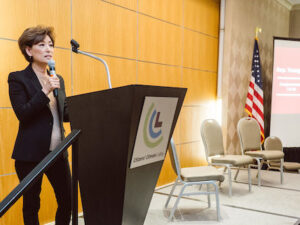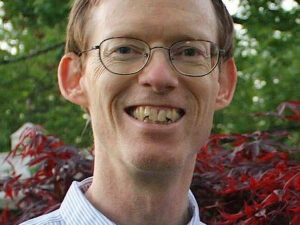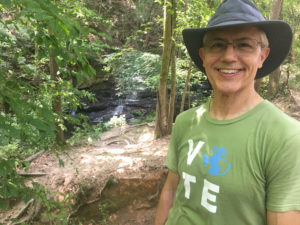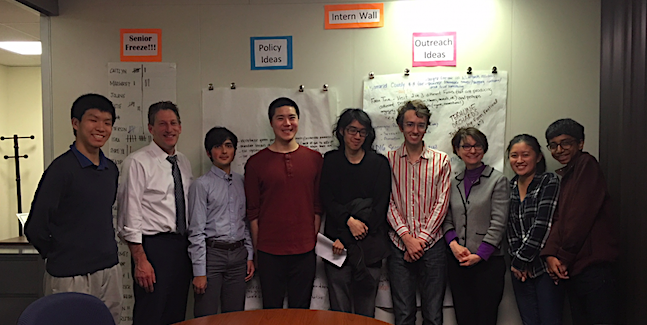
Jonathan Lu (fourth from left) with other members of the Princeton Climate Initiative
Volunteer Spotlight: Jonathan Lu
By Natalie Desmaris
Recent Princeton graduate Jonathan Lu is a pre-med, computer science major, and is now pursuing his Master’s degree in Computer Science. He spends his free time doing machine learning research, swimming, and discussing the social and ethical implications of computer science with other students and faculty. He realized there was a lack of conversation about climate change among students on campus, so he founded the Princeton Student Climate Initiative. After initial grassroots outreach at school using CCL’s own constituent engagement kit, the group wanted to go to the state level. NJ State Assemblyman Andrew Zwicker asked them to write a white paper on how a carbon pricing policy for the state could look.
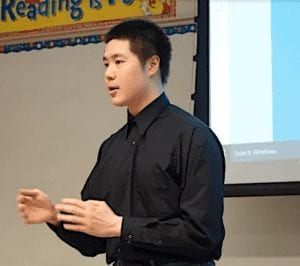
Jonathan Lu
What do you like about carbon pricing?
It’s politically feasible. You don’t have to care about the environment to understand that carbon pricing is good for public health issues and for encouraging companies to save energy and money. It’s also one of the simplest policies: not everyone has the interest or ability to calculate all the ways they emit CO2, but everyone can choose a cheaper option when given two options. If you make it cheaper to pollute less, everyone will pollute less. It makes sense that we should be paying for the effects of our actions on our society.
What do you like about CCL?
CCL is such a positive, empowering, solutions-focused organization. It makes you optimistic that you can do something even if you’re not one of the people writing or signing bills. It’s focused on finding common ground. It’s great that CCL really invests in its members; you’re a part of a group and you’re in it together. Other groups may not be as focused on members that way. In climate change conversations, talking to people who disagree with you is an important but missing message. CCL’s solution-focused approach, instead of problem-focused, is especially key. That’s a step forward from other environmental activism that’s focused on, “Do you believe this is a problem or not?” Having something to fight for creates a more positive conversation. I wish there was CCL for other social issues!
What are you and your group working on at Princeton?
We’re working on convening a climate policy stakeholder forum, including leaders of the environmental, business, labor, and government sectors. We want to ask them what policies New Jersey should implement in the next 10 years to achieve its 2050 emissions goals, and have a dialogue and understand the perspectives of different stakeholders; several legislators have told us this is a valuable, but missing, conversation. Hopefully this can be a launch point to then partner with organizations and create the seed of a coalition working toward effective climate policy in the state.
How do you and your team stay motivated in all your work?
I stay motivated because when I start something, I want to see it through. It’s very exciting work, all pretty creative and interesting. It’s not too hard to find motivation, just finding the time. Delegating small tasks works pretty well, and I’ve been really lucky to work with people who are committed. That’s just the culture of the group that we have, people who decide to spend their weekends working to save our planet.
How do you see this influencing your future aspirations?
Climate change has always been sort of a side passion for me. I’ve always felt it’s morally wrong for me not to do anything about climate change regardless of how it affects my career. It doesn’t feed directly into my chosen field (medicine), but I’ve gained so many useful skills about how to talk to people, and how to lead a group. Hopefully I’ll be able to act as a communicator and messenger about climate related issues in my new field. Climate change really does affect everything; maybe you’re not working on it specifically, but you want your doctors, army generals, engineers, and citizens to know that it’s happening so that they’re prepared.
Are you interested in starting a climate campaign at your school? Learn how at www.citizensclimatehighered.org and join the Campus Leaders Program. If you’re not a student, you can help the team do outreach to higher education through Higher Ed Allies. Please contact clara.fang @ citizensclimatelobby.org with questions.
Got a suggestion for our Volunteer Spotlight series? Send the name, chapter and some brief info about the volunteer to Flannery Winchester at flannery @ citizensclimatelobby.org.

